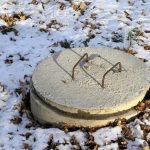 Septic systems are an essential part of many homes, providing a safe and efficient way to manage wastewater. However, during the winter months, septic systems can face specific challenges that can lead to issues. In this blog post, we will discuss common problems that can arise with septic systems during winter and provide tips for prevention and maintenance.
Septic systems are an essential part of many homes, providing a safe and efficient way to manage wastewater. However, during the winter months, septic systems can face specific challenges that can lead to issues. In this blog post, we will discuss common problems that can arise with septic systems during winter and provide tips for prevention and maintenance.
1. Freezing of Drain and Leach Fields
One of the primary concerns during winter is the freezing of drain and leach fields. As temperatures drop, the water in the soil can freeze, causing blockages in the septic system. This can prevent proper drainage and lead to backups in your plumbing. To minimize the risk of freezing, ensure that the drain field is properly insulated and that water is being adequately distributed throughout the system. Avoid driving heavy vehicles or equipment over the drain field area, as this can compact the soil and make it more susceptible to freezing.
2. Inadequate Insulation
Septic tanks and pipes are susceptible to freezing if they are not adequately insulated. Insufficient insulation can lead to the temperature of the wastewater dropping below freezing, causing clogs and potential damage to the system. To prevent this issue, make sure that your septic tank and pipes are properly insulated. This can include using insulation blankets or foam sleeves to protect exposed pipes, ensuring that the tank is covered with insulating materials, and sealing any cracks or openings that could let cold air in.
3. Excessive Water Usage
During the winter months, many households experience increased indoor water usage due to activities like cooking, bathing, and laundry. Excessive water usage can overload the septic system and lead to backups or failures. Be mindful of your water usage during winter and spread out heavy water use activities throughout the day. Avoid doing multiple loads of laundry or running the dishwasher in quick succession, as this can put a strain on the system. Additionally, fixing any leaks promptly can help conserve water and prevent unnecessary stress on the septic system.
4. Solid Waste Accumulation
Reduced microbial activity in the septic tank during the winter can cause solid waste to accumulate more quickly. Cold temperatures can slow down the rate of decomposition, resulting in the build-up of sludge and scum. Regular septic tank pumping is crucial to prevent clogs and ensure the system operates efficiently. If you haven’t had your septic tank pumped in the last few years, winter is an ideal time to schedule this maintenance task.
5. Snow and Ice Damage
Snow and ice accumulation can cause damage to septic system components. Heavy snow loads can put pressure on tanks or distribution boxes, and ice formations can interfere with the proper functioning of the system. Clearing snow away from key components of the septic system can help prevent potential harm. However, it is essential to exercise caution and avoid using sharp tools or heavy equipment that could cause damage. If you’re unsure about clearing snow around your septic system, it is best to consult a professional for assistance.
6. Lack of Maintenance
Neglecting septic system maintenance is a common issue that can lead to problems during the winter months. Regular inspections, pumping, and proper care are essential for the optimal function of your septic system. Schedule routine maintenance before winter sets in to ensure your system is in good working order. A professional septic service provider can conduct an inspection, identify any potential issues, and provide the necessary maintenance or repairs.
7. Poor Drainage and Runoff
The excess water from melting snow can create drainage issues around the septic system. Poorly designed or maintained drainage systems can lead to water pooling near the septic components, increasing the risk of system failure or freezing. Ensure that your property has proper drainage systems in place to redirect melting snow and runoff away from the septic system. Additionally, avoid excessive salt application on driveways or walkways near the septic system, as salt can compromise its functionality.
Summary
Winter poses unique challenges for septic systems. Freezing, inadequate insulation, excessive water usage, solid waste accumulation, snow and ice damage, lack of maintenance, and poor drainage can all contribute to septic system issues during this season. Taking preventive measures, such as insulating pipes, managing water usage, scheduling regular maintenance, and ensuring proper drainage, can help minimize the risk of problems. If you encounter any issues with your septic system, it is best to contact a professional septic service provider for assistance and repairs. By taking care of your septic system during winter, you can ensure its functionality and avoid costly and inconvenient problems.
